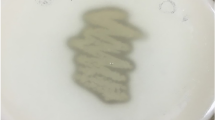Abstract
The identification and applicability of bacteria are inconclusive until comprehended with genomic repositories. Our isolate, Exiguobacterium sp. TBG-PICH-001 exhibited excellent halo- and organic solvent tolerance with simultaneous production of alkaline protease/s (0.512 IU/mL). The crude protease (1 IU) showed a 43.57% degradation of whey protein. The bulk proteins in the whey were hydrolyzed to smaller peptides which were evident in the SDS-PAGE profile. With such characteristics, the isolate became interesting for its genomic studies. The TBG-PICH-001 genome was found to be 3.14 Mb in size with 17 contigs and 47.33% GC content. The genome showed 3176 coding genes, and 2699 genes were characterized for their functionality. The Next-Generation-Sequencing of the genome identified only the isolate’s genus; hence we attempted to delineate its species position. The genomes of the isolate and other representative Exiguobacterium spp. were compared based on orthologous genes (Orthovenn2 server). A pan-genomic analysis revealed the match of TBG-PICH-001 with 15 uncharacterized Exiguobacterium genomes at the species level. All these collectively matched with Exiguobacterium indicum, and the results were reconfirmed through phylogenetic studies. Further, the Exiguobacterium indicum genomes were engaged for homology studies rendering 11 classes of protease genes. Two putative proteases (Zinc metalloprotease and Serine protease) obtained from homology were checked for PCR amplification using genomic DNA of TBG-PICH-001 and other Exiguobacterium genomes. The results showed amplification only in the Exiguobacterium indicum genome. These protease genes, after sequencing, were matched with the TBG-PICH-001 genome. Their presence in its whole genome experimentally validated the study.






Similar content being viewed by others
Data availability
The whole genome sequencing data were submitted to GenBank (submission ID-SUB8476607), and accession number- JADOYC000000000 was released into the GenBank for the TBG-PICH-001 genome.
References
Altschul SF, Madden TL, Schaffer AA et al (1997) Gapped BLAST and PSI-BLAST: a new generation of protein database search programs. Nucleic Acids Res 25(17):3389–3402. https://doi.org/10.1093/nar/25.17.3389
Bach E, Rangel CP, Ribeiro IDA (2022) Pangenome analyses of Bacillus pumilus, Bacillus safensis, and Priestia megaterium exploring the plant-associated features of bacilli strains isolated from canola. Mol Genet Genom. https://doi.org/10.1007/s00438-022-01907-0
Baur S, Belle N, Frank O et al (2022) Steroidal saponins-New sources to develop potato (Solanum tuberosum L.) genotypes resistant against certain Phytophthora infestans strains. J Agric Food Chem. https://doi.org/10.1021/acs.jafc.2c02575
Bharathi M, Senthil Kumar N, Chellapandi P (2020) Functional prediction and assignment of Methanobrevibacter ruminantium M1 operome using a combined bioinformatics approach. Front Genet 11:593990. https://doi.org/10.3389/fgene.2020.593990
Bohmova A, Leong-Skornickova J, Sida O et al (2023) Next-generation sequencing data show rapid radiation and several long-distance dispersal events in early Costaceae. Mol Phylogenet Evol 179:107664. https://doi.org/10.1016/j.ympev.2022.107664
Bradford MM (1976) A rapid and sensitive method for the 537 quantitation of microgram quantities of protein utilizing the 538 principle of protein-dye binding. Anal Biochem 72:248–254
Camacho C, Coulouris G, Avagyan V et al (2009) BLAST+: architecture and applications. BMC Bioinform 10(1):1–9. https://doi.org/10.1186/1471-2105-10-421
Chiba A, Peine M, Kublik S et al (2022) Complete genome sequence of Psychrobacillus sp. strain INOP01, a phosphate-solubilizing bacterium isolated from an agricultural soil in Germany. Microbiol Resour Announc 11(4):00207–00222. https://doi.org/10.1128/mra.00207-22
Chun J, Lee JH, Jung Y et al (2007) EzTaxon: A web-based tool for the identification of prokaryotes based on 16S ribosomal RNA gene sequences. Int J Syst Evol Microbio 57:2259–2261. https://doi.org/10.1099/ijs.0.64915-0
Collins MD, Lund BM, Farrow JAE et al (1983) Chemotaxonomic study of an alkalophilic bacterium, Exiguobacterium aurantiacum gen. nov., sp. nov. Microbiology 129(7):2037–2042. https://doi.org/10.1099/00221287-129-7-2037
Ebner JN (2021) Trends in the application of “omics” to ecotoxicology and stress ecology. Genes 12(10):1481. https://doi.org/10.3390/genes12101481
Fang H, Xu JB, Nie Y et al (2021) Pan-genomic analysis reveals that the evolution of Dietzia species depends on their living habitats. Environ Microbiol 23(2):861–877. https://doi.org/10.1111/1462-2920.15176
Galardini M, Biondi EG, Bazzicalupo M et al (2011) CONTIGuator: a bacterial genomes finishing tool for structural insights on draft genomes. Source Code Biol Med 6:11. https://doi.org/10.1186/1751-0473-6-11
Garrity GM, Stanley JT (2001) Bergey’s manual of systematic bacteriology: volume one the archaea and the deeply branching and phototrophic bacteria. Springer, New York
Girma B, Panda AN, Roy PC et al (2022) Molecular, biochemical, and comparative genome analysis of a rhizobacterial strain Klebsiella sp. KBG6. 2 imparting salt stress tolerance to Oryza sativa L. Environ Exp Bot 203:105066. https://doi.org/10.1016/j.envexpbot.2022.105066
Gupta A, Khare SK (2007) Enhanced production and characterization of a solvent stable protease from solvent tolerant Pseudomonas aeruginosa PseA. Enzyme Microb Technol 42(1):11–16. https://doi.org/10.1016/j.enzmictec.2007.07.019
Gupta A, Khare SK (2009) Enzymes from solvent-tolerant microbes: useful biocatalysts for non-aqueous enzymology. Crit Rev Biotechnol 29(1):44–54. https://doi.org/10.1080/07388550802688797
Iqbal S, Bhatti MF, Javed A et al (2022) Whole-genome sequence of a putative pathogenic Bacillus sp. strain SD-4 isolated from cattle feed. J Glob Antimicrob Resist. https://doi.org/10.1016/j.jgar.2022.04.002
Korbel JO, Snel B, Huynen MA et al (2002) SHOT: a web server for the construction of genome phylogenies. Trends Genet 18(3):158–162. https://doi.org/10.1016/S0168-9525(01)02597-5
Kreft L, Botzki A, Coppens F et al (2017) PhyD3: A phylogenetic tree viewer with extended phyloXML support for functional genomics data visualization. Bioinformatics 33:2946–2947. https://doi.org/10.1093/bioinformatics/btx324
Kumar SS, Jithin V, Jijeesh V et al (2018) Production and purification of alkaline protease from Exiguobacterium indicum TBG-PICH-001 isolated from soil samples of Pichavaram Estuary (Tamil Nadu). Indian J Geol Mar Sci 47(03):580–586
Kumar H, Manoharan A, Anbarasu A et al (2023) Emergence of sulphonamide resistance in azithromycin-resistant pediatric strains of Salmonella typhi and paratyphi A: A genomics insight. Gene 851:146995. https://doi.org/10.1016/j.gene.2022.146995
Kunin V, Goldovsky L, Darzentas N et al (2005) The net of life: reconstructing the microbial phylogenetic network. Genome Res 15(7):954–959. https://doi.org/10.1101/gr.3666505
Lagesen K, Hallin P, Rodland EA et al (2007) RNAmmer: Consistent and rapid annotation of ribosomal RNA genes. Nucleic Acids Res 35:3100–3108. https://doi.org/10.1093/nar/gkm160
Langmead B, Salzberg SL (2012) Fast gapped-read alignment with Bowtie 2. Nat Methods 9:357–359. https://doi.org/10.1038/nmeth.1923
Laslett D, Canback B (2004) ARAGORN, a program to detect tRNA genes and tmRNA genes in nucleotide sequences. Nucleic Acids Res 32:11–16. https://doi.org/10.1093/nar/gkh152
Lefort V, Desper R, Gascuel O (2015) FastME 2.0: A comprehensive, accurate, and fast distance-based phylogeny inference program. Mol Biol Evol 32:2798–2800. https://doi.org/10.1093/molbev/msv150
Liu F, Li Y, He W et al (2021) Exiguobacterium algae sp. nov. and Exiguobacterium qingdaonense sp. nov., two novel moderately halotolerant bacteria isolated from the coastal algae. Antonie Van Leeuwenhoek 114(9):1399–1406. https://doi.org/10.1007/s10482-021-01594-8
Meier-Kolthoff JP, Goker M (2019) TYGS is an automated high-throughput platform for state-of-the-art genome-based taxonomy. Nat Commun 10:1–10. https://doi.org/10.1038/s41467-019-10210-3
Meier-Kolthoff JP, Auch AF, Klenk HP et al (2013) Genome sequence-based species delimitation with confidence intervals and improved distance functions. BMC Bioinform 14:60. https://doi.org/10.1186/1471-2105-14-60
Meier-Kolthoff JP, Klenk HP, Goker M (2014) Taxonomic use of DNA G+ C content and DNA–DNA hybridization in the genomic age. Int J Syst Evol 64(2):352–356. https://doi.org/10.1099/ijs.0.056994-0
Meier-Kolthoff JP, Carbasse JS, Peinado-Olarte RL et al (2022) TYGS and LPSN: a database tandem for fast and reliable genome-based classification and nomenclature of prokaryotes. Nucleic Acids Res 50(1):801–807. https://doi.org/10.1093/nar/gkab902
Meng X, Chang YQ, Zhou LY (2020) Exiguobacterium flavidum sp. Nov., isolated from the red maple lake. Int J Syst Evol 70(4):2359–2365. https://doi.org/10.1186/1471-2105-14-60
Muneeswari R, Iyappan S, Swathi KV et al (2021) Genomic characterization of Enterobacter xiangfangensis STP-3: Application to real time petroleum oil sludge bioremediation. Microbiol Res 253:126882. https://doi.org/10.1016/j.micres.2021.126882
Ondov BD, Treangen TJ, Melsted P et al (2016) Mash: Fast genome and metagenome distance estimation using MinHash. Genome Biol 17:132. https://doi.org/10.1186/s13059-016-0997-x
Patel RK, Jain M (2012) NGS QC toolkit: A toolkit for quality control of next generation sequencing data. PLoS ONE 7:30619. https://doi.org/10.1371/journal.pone.0030619
Prajapati A, Yogisharadhya R, Mohanty NN et al (2022) Comparative genome analysis of Pasteurella multocida serogroup B: 2 strains causing haemorrhagic septicaemia (HS) in bovines. Gene 826:146452. https://doi.org/10.1016/j.gene.2022.146452
Remonsellez F, Castro-Severyn J, Pardo-Este C et al (2018) Characterization and salt response in recurrent halotolerant Exiguobacterium sp. SH31 isolated from sediments of Salar de Huasco, Chilean atiplano. Front Microbiol 9:2228. https://doi.org/10.3389/fmicb.2018.02228/full
Sherman BT, Hao M, Qiu J et al (2022) DAVID: a web server for functional enrichment analysis and functional annotation of gene lists (2021 update). Nucleic Acids Res. https://doi.org/10.1093/nar/gkac194
Shiburaj S, Salim S, Srivastava N, Ravindran P et al (2022) Genome sequence analysis of Exiguobacterium sp. strain TBG-PICH-001, isolated from Pichavaram Mangrove Forest in South India. Microbiol Resour Announc 11(5):100096–100122. https://doi.org/10.1128/mra.00096-22
Shimogaki H, Takeuchi K, Nishino T et al (1991) Purification and properties of a novel surface-active agent-and alkaline-resistant protease from Bacillus sp. Y Chem Biol Technol Agric 55(9):2251–2258. https://doi.org/10.1080/00021369.1991.10870947
Simao FA, Waterhouse RM, Ioannidis P et al (2015) BUSCO: assessing genome assembly and annotation completeness with single-copy orthologs. Bioinformatics 31(19):3210–3212. https://doi.org/10.1093/bioinformatics/btv351
Sinha R, Khare SK (2015) Immobilization of halophilic Bacillus sp. EMB9 protease on functionalized silica nanoparticles and application in whey protein hydrolysis. Bioprocess Biosyst Eng 38:739–748. https://doi.org/10.1007/s00449-014-1314-2
Srivastava AK, Srivastava R et al (2020) Pan-genome analysis of Exiguobacterium reveals species delineation and genomic similarity with Exiguobacterium profundum PHM 11. Environ Microbiol Rep 12(6):639–650. https://doi.org/10.1111/1758-2229.12890
Srivastava N, Kumar S, Shiburaj S et al (2021) Cellular adaptation responses in a halotolerant Exiguobacterium exhibiting organic solvent tolerance with simultaneous protease production. Environ Technol Innov 23:101803. https://doi.org/10.1016/j.eti.2021.101803
Srivastava AK, Srivastava R, Bharati AP et al (2022) Analysis of biosynthetic gene clusters, secretory, and antimicrobial peptides reveals environmental suitability of Exiguobacterium profundum PHM11. Front Microbiol 12:4081. https://doi.org/10.3389/fmicb.2021.785458
Su Z, Wang S, Yang S et al (2021) Genetic and comparative genome analysis of Exiguobacterium aurantiacum SW-20, a petroleum-degrading bacteria with salt tolerance and heavy metal-tolerance isolated from produced water of changqing oilfield, hina. Microorganisms 10(1):66. https://doi.org/10.3390/microorganisms10010066
Wang J, Lu C, Xu Q et al (2023) Comparative genomics analysis provides new insights into high ethanol tolerance of Lactiplantibacillus pentosus LTJ12, A novel strain isolated from Chinese Baijiu. Foods 12(1):35. https://doi.org/10.3390/foods12010035
Wee J, Xia K (2022) Persistent spectral based ensemble learning (PerSpect-EL) for protein–protein binding affinity prediction. Brief Bioinform. https://doi.org/10.1093/bib/bbac024
Widanagama SD, Freeland JR, Xu X et al (2022) Genome assembly, annotation, and comparative analysis of the cattail Typha latifolia. G3 12(2):401. https://doi.org/10.1093/g3journal/jkab401
Xu H, Luo X, Qian J et al (2012) FastUniq: a fast de novo duplicates removal tool for paired short reads. PLoS ONE 7(12):e52249. https://doi.org/10.1371/journal.pone.0052249
Xu L, Dong Z, Fang L et al (2019) OrthoVenn2: a web server for whole-genome comparison and annotation of orthologous clusters across multiple species. Nucleic Acids Res 47(1):52–58. https://doi.org/10.1093/nar/gkz333
Zerbino DR, Birney E (2008) Velvet: algorithms for de novo short read assembly using de Bruijn graphs. Genome Res 18:821–829. https://doi.org/10.1101/gr.074492.107
Acknowledgements
The authors gratefully acknowledge the financial grant provided by the Department of Biotechnology, India (BT/PR26709/AAQ/3/889/2017) for carrying out this study. Nitin Srivastava is grateful to the DST-SERB (Govt. Of India) for Junior Research Fellowship.
Author information
Authors and Affiliations
Contributions
All authors contributed to the study conception and design. Material preparation, data collection and analysis were performed by NS and SKK. The first draft of the manuscript was written by NS and all authors commented on previous versions of the manuscript. The manuscript was thoroughly reviewed by SS. All the authors read and approved the final manuscript.
Corresponding author
Ethics declarations
Conflict of interest
The authors declare that they have no known competing financial interests or personal relationships that could have appeared to influence the work reported in this paper.
Research involving human participants and/or animals
This article does not contain any studies with human participants or animals performed by any of the authors.
Informed consent
Not applicable.
Supplementary Information
Below is the link to the electronic supplementary material.
Rights and permissions
Springer Nature or its licensor (e.g. a society or other partner) holds exclusive rights to this article under a publishing agreement with the author(s) or other rightsholder(s); author self-archiving of the accepted manuscript version of this article is solely governed by the terms of such publishing agreement and applicable law.
About this article
Cite this article
Srivastava, N., Shiburaj, S. & Khare, S.K. Pan-genomic comparison of a potential solvent-tolerant alkaline protease-producing Exiguobacterium sp. TBG-PICH-001 isolated from a marine habitat. 3 Biotech 13, 371 (2023). https://doi.org/10.1007/s13205-023-03796-5
Received:
Accepted:
Published:
DOI: https://doi.org/10.1007/s13205-023-03796-5




